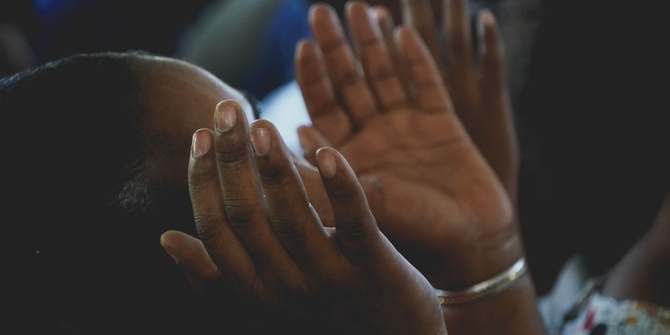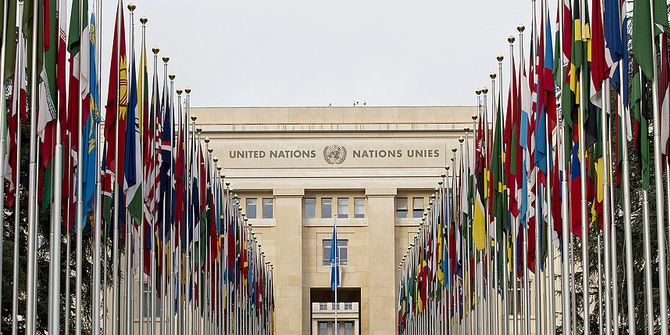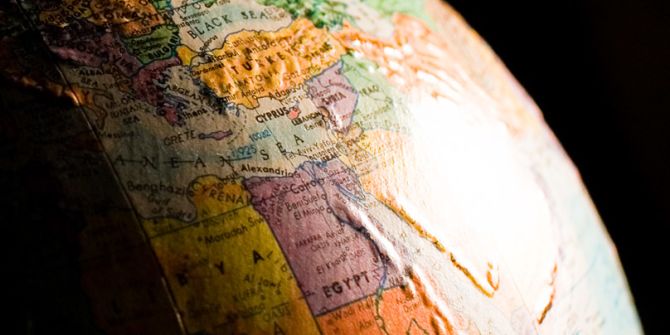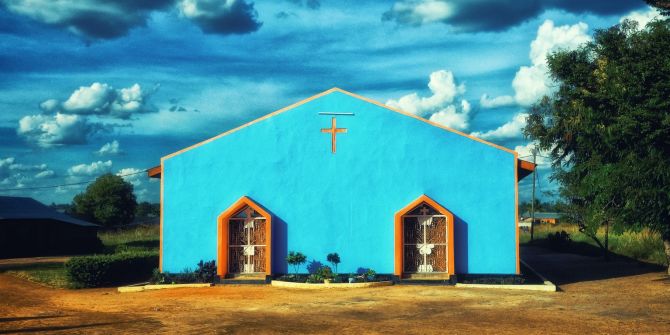In a new journal article Edward Ademolu presents his study of Christian and Muslim Nigerians in London, their Africa-bound philanthropic giving, and what this means for our understanding of international development. Transnational charitable giving is an integral part of many diaspora communities, and is often inspired by religion, or even is itself a religious act.

My relationship and identification with religion is at once predetermined and concreted by family functioning, as it is iterative, eclectic and unintentionally anthropological. I am the product of an interdenominational Christian marriage, with a migrant-British father who was raised in the liturgical traditions of Nigerian Anglicanism led by the Church of Nigeria and a UK-born and partly Nigerian-raised Roman Catholic mother, whose father, an Oba, subscribed to the indigenous, precolonial Yoruba religion, spiritualism and practices of Ifa, and whose own father before him—my great-grandfather—was conferred with the supreme pontiff-awarded, Knight Papal Order of Sylvester. While I, a British Nigerian, Southwark-bred hybrid of Anglo-Catholic-complementarity, spent his formative years attending disproportionately white Anglican and Catholic churches before exploring the ceremonial worship styles of many different UK-based Nigerian and Black Majority Churches during adolescence and young adulthood.
Within these walls of former bingo halls, leisure centres, school gymnasiums and working men’s clubs; the urgency with which to achieve an intimate spiritual approximation to the ‘Most High’ was a currency routinely traded. However, equally notable within these spaces was the extent of parishioners’ philanthropic contributions via the church and allied religious and community organisations to support poverty-alleviating missions in continental Africa, even—and very often—at the expense of significant personal sacrifice. Be it a bake sale, a sponsored run, a pay-to-watch talent showcase, voluntary church offerings, or shipping second-hand clothing and toiletries to Nigerian orphanages and single-mother shelters, I observed that traditions of transnational ‘giving’ and charitable servicing, among predominantly Nigerian congregations, were deeply implicated within and advocated by their symbolic expressions and materialisms of faith. While it is important to note the role prosperity theology—sometimes known as the health and wealth gospel—has in these acts of giving, it is equally important to recognise how their philanthropic propensity verged on the seemingly secular work of international development.
While religious communities have made significant material contributions to local and international forms of ‘development’ in practice, until recently this was largely marginalised within academia and by key international development players. This is partly explained by the received wisdom that religion is largely opposed to technocratic rationalities and materialisms of economic development and that, as societies modernise, this functional disposition of religion will become obsolete. However, these deterministic assumptions of religion and society’s inverse relationship have been critiqued, problematised and debunked by different academic disciplines. Rather than declining or all-together evaporating into thin air, the functionality of religion(s) for development is widely accepted even if its role is both complex and controversial. As such, while religion is basking in the glory of its long-awaited Cinderella moment—given its ‘policy-sexy’ significance in development agendas—less considered are the broader public understandings of development that are informed by religion and faith subjectivities, especially for African diaspora communities engaged in international and local forms of development. How do they conceive development? How is it practiced?
Addressing this gulf in knowledge has important implications for the scholarly and programmatic application of development and attendant policy recommendations. This is especially true when recognising African diaspora identities as critical for engendering particular forms of cooperation and alliance with religious members of these communities. So too, how and to what extent their religious orientations shape and determine their different priorities, strategies and traditions of ‘help’ and ‘giving’ in and for their countries and communities of heritage.
As such, are we to assume that religion(s) and faith identifications are inconsequential or secondary to how diaspora participate in and negotiate understandings of international development? Or are they much more significant and constitutive than we think? Is there space for religiously informed interpretations of international development that move beyond its definitional and operational preoccupation with technocratic rationality to allow for new and extended conceptual possibilities? All these speculative questions and theoretical possibilities constitute the intellectual space within which my recent article, “An Outward Sign of an Inward Grace”: How African Diaspora Religious Identities Shape their Understandings of and Engagement in International Development’, is concerned.
Using first-and-second-generation London-based Christian and Muslim Nigerians, as a case study, I reveal that religion, religious identities and ‘narratives of faith’ are all instrumental for understanding how these diaspora communities, as development actors, assign meaning to and participate in international development. This is best understood in their religiously moralised evaluations, rationalities and theological obligations for engaging in development-related activities largely in the form of private remittances and allied non-monetary contributions and services to Nigeria and continental Africa more generally, via their places of worship.
That is, for Nigerians, their Christian and Muslim identities provide the theological and doctrinal foundation and vocabulary through which they articulate (and demonstrate) their interpretations of international development. These faith(ed)-vocabularies of development are undergirded by and organised around embodied discourses of humanitarianism, compassion, and justice. The significance of this religious moralising by Nigerians also extends to their conceptualisation of their development activities as “consecrated acts” operating within systems of meaning and practices associated with, and constituted by, moral expectations and cultural obligations that frame and signify their religious and faith orientations.
Within this frame, development is dually understood by Nigerians as a ‘performance’ practicality or an ‘action-ing’ of their religious-faith identities and of their embodied ‘religious selves’. Certainly, these communities conceive religion and their religious selves as not just significant for development practice but as development itself. Consequently, my article argues for a (re)theorisation of international development that affords space to alternative articulations that necessarily include transnational Afro-religious diasporic performativity.
Note: Edward’s full article can be accessed here.
Note: This piece gives the views of the author(s), and not the position of the LSE Religion and Global Society blog, nor of the London School of Economics.




